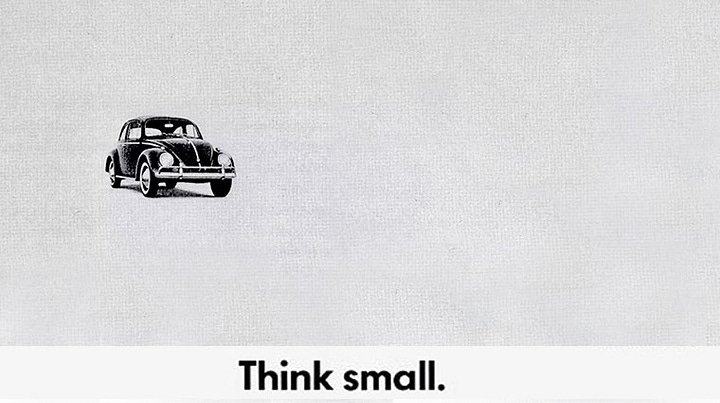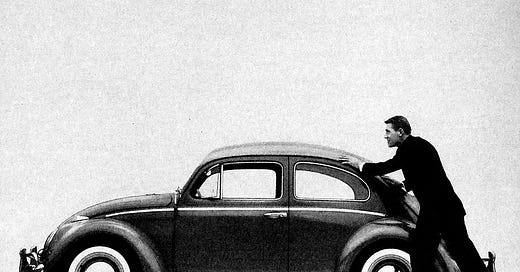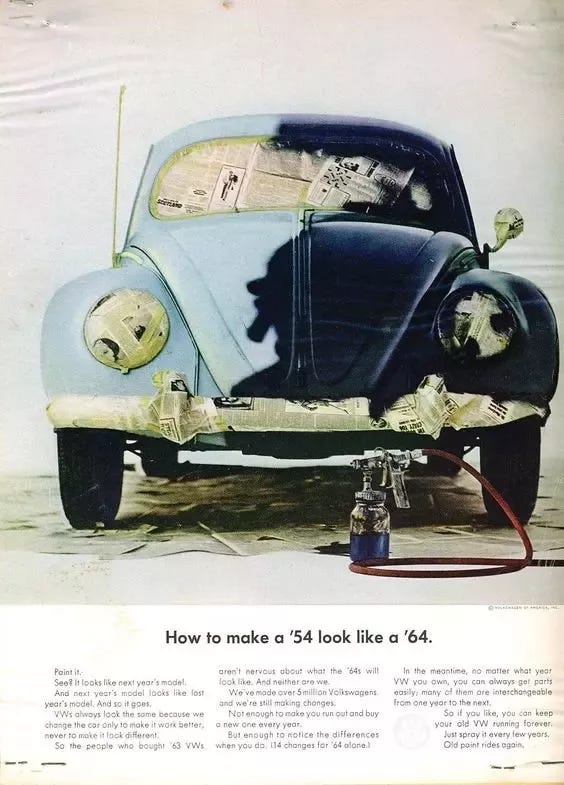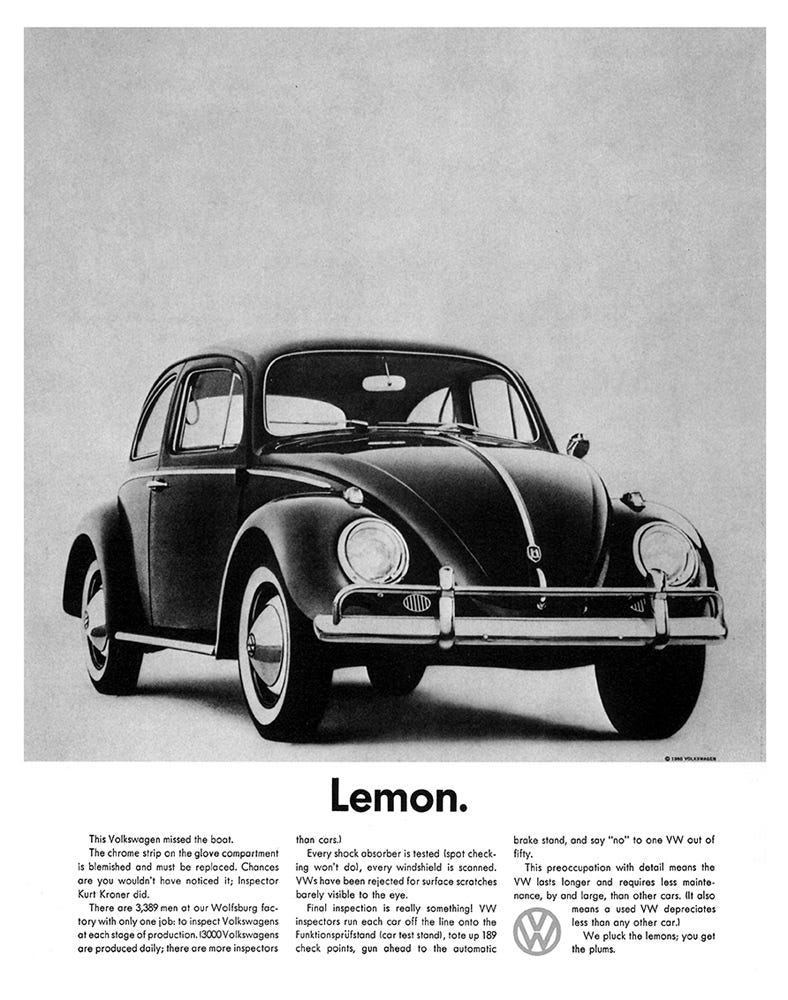This is the incredible story of how the Volkswagen Beetle went from being the “Führer’s car” to a worldwide bestseller (before the Toyota Corolla took over).
Just imagine this: it’s 1949. You’re a German car entering the US market. The war is over and you’re a big sore loser bracing yourself for endless humiliation. How on Earth is a car commissioned by Hitler going to compete against the all-American General Motors?
Not only is there political stigma, your cultural fit is completely off. The Americans like big, fast, and strong. They like money, status, and sex. Gas is cheap and decadence is hot. Small, economical, and oddly shaped, the Type 1 (later known as the Beetle) just isn’t in demand.
I don’t think what we’re being offered here is worth a damn! — Ernest Breech, chairman of the Ford board, after being offered the Type 1 for free by the Brits who deemed the car “quite unattractive to the average motorcar buyer”
You try to rebrand. How about “Victory Wagon”? No use. By 1955, the automobile you drove symbolized your tax bracket. Detroit automakers changed the appearance of their products every year, making it easy to tell a 1959 model from a 1958, a 1957, etc., in order to sell more cars to status-conscious buyers. While the number of cars on US roads doubled from 25 million to over 50 million in just a single decade after the war, only two Beetles were sold in its first year in the US.
So, how did the Beetle turn into such an emblem of American culture?
With humor. Indeed, a good comeback is a form of art.
You come to accept that you stand no chance against the athletes and the country-clubbers. Fine. If the market is going to see you as a loser, then you’ll sell like a loser. Reverse the script and turn every perceived flaw into an advantage:
They think you’re small? You make their house look bigger:
They think you’re outdated? You tell them they’re vain for caring only about looks:
Can’t afford advertisements in color? You print your copies in black-and-white. The result? Every Manhattanite commuting to his skyscraper job pauses on your page amid the sea of vibrant, candy-hued copies in the morning papers:


Your ads are saying, “look, I’m don’t have Porsche’s speed or Chevrolet’s muscles. I’m not as sexy as Mercedes-Benz and I’m not as classy as Cadillac. I’ll never be as patriotic as Ford because I’m German to the core. I know what I am…and I’m proud of it. I’m not made to be shown off, I’m made to be functional: my purpose is to get you from point A to point B. The status-obsessed men who want flashy metal pets — let them race their Corvettes. If being practical is enough for you, I’m it for the job.”
How humor creates charisma
Volkswagen’s ad agency, Doyle Dane Birnbach (DDB), chose to compete with General Motors by not competing with them at all. It doesn’t matter if people call VW slow or ugly because speed and beauty aren’t what VW cares to win at anyway. VW is basically saying, “Here’s what being a loser can do: losers save money. Losers have bigger parking spaces. Losers care about quality more than looks. If all these things are for losers, then we’re happy to lose.”
There are many ways to make fun of oneself and there’s a fine line between being funny and being pitiful. The difference between charisma and being an actual loser is CONFIDENCE. There is one area where Volkswagen defeats the American brands and they know it: it’s quality. German engineering is associated with world-class excellence, and Volkswagen boldly believes that quality alone trumps muscle, speed, sex appeal, status, and everything else that orchestrates American consumerism.
And so they play to their advantage. Read this copy:
It’s about car inspector Kurt Kroner, whose standards were so exacting that even a blemished piece of trim would prevent a car from being exported. Yet, they call the pictured Beetle a “lemon”, which means it’s a poorly made product. In other words, that ad is sarcastically saying, “when it comes to quality, Volkswagen’s worst is everyone else’s best.” (If you’ve ever heard of lemon laws, this advertisement is where it all started. That’s how iconic this campaign was.)
Even if the Beetle is slow, its quality can make it the fastest:
The copy is saying, “We may be a tortoise but we’re the tortoise in Aesop’s tale.”
Everyone knows that these ads are joking about oddly specific situations, yet, the magic of this kind of humor is that it exposes a truth. Volkswagen is saying that the Emperor is naked: under all the superficial features that American carmakers need to use in order to sell their products, there is simply no promise of quality, safety, or efficiency.
The name tells you everything: Volkswagen translates to “people’s car”. In a cheeky, proletariat tone, it says, “you’re on the wrong side if you’re falling for those shiny expensive cars — they don’t care about you, they just want your money. When you buy a car that’s made in Detroit, who wins? Some guy in a suit on Madison Avenue. Not you.”
Be the wise fool
Volkwagen shows that having full confidence in who you are makes you attractive. A loser who doesn’t mind being a loser actually wins. Those who embrace authenticity escape competition. The only thing worse than being insulted is taking that insult seriously instead of making a funny comeback out of it.
Humor gets to the truth faster than logic. Having a good sense of humor makes you more confident because it shows that you don’t take yourself too seriously. You’re secure about who you are. Being overly sensitive is what actually makes you a real loser.
When you make a mistake and turn it into something funny, you transform something contemptuous into something respectable. Admirable, even. By being able to take a joke, especially one that is at your own expense, you show that you can accept the fact that you’re imperfect. That’s true confidence.
This is why humor is the ultimate indication of wisdom: if there’s a part of you that’s being laughed at, then there’s also a part of you that recognizes your own foolishness — the part that’s doing the laughing.
In a single joke, snappy comeback, or advertisement, you tell the world, “I’m self-aware and humble enough to know my weaknesses, yet I’m confident enough to not be offended because I can always win on my own terms.”
PS. Recommended readings! On confidence, “Escape Competition Through Authenticity”, and on self-deprecating humor, “Roman Roy, Psychoanalyzed”











And then there were the Herbie films!
Not only in marketing, I think you can apply this principle in sales as well.